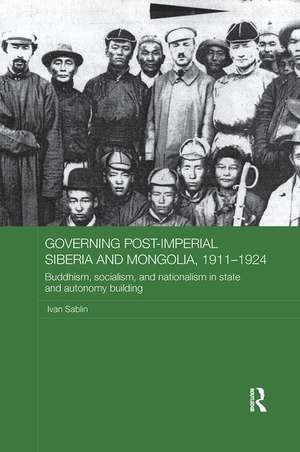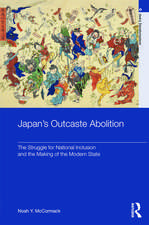Governing Post-Imperial Siberia and Mongolia, 1911-1924: Buddhism, Socialism and Nationalism in State and Autonomy Building: Routledge Studies in the History of Russia and Eastern Europe
Autor Ivan Sablinen Limba Engleză Paperback – 24 mai 2017
| Toate formatele și edițiile | Preț | Express |
|---|---|---|
| Paperback (1) | 444.62 lei 6-8 săpt. | |
| Taylor & Francis – 24 mai 2017 | 444.62 lei 6-8 săpt. | |
| Hardback (1) | 1054.75 lei 6-8 săpt. | |
| Taylor & Francis – 4 feb 2016 | 1054.75 lei 6-8 săpt. |
Din seria Routledge Studies in the History of Russia and Eastern Europe
- 15%
 Preț: 403.76 lei
Preț: 403.76 lei -
 Preț: 325.11 lei
Preț: 325.11 lei - 9%
 Preț: 935.04 lei
Preț: 935.04 lei -
 Preț: 284.52 lei
Preț: 284.52 lei - 14%
 Preț: 315.08 lei
Preț: 315.08 lei - 18%
 Preț: 1057.40 lei
Preț: 1057.40 lei -
 Preț: 427.12 lei
Preț: 427.12 lei - 14%
 Preț: 325.34 lei
Preț: 325.34 lei - 18%
 Preț: 273.05 lei
Preț: 273.05 lei - 18%
 Preț: 1279.68 lei
Preț: 1279.68 lei -
 Preț: 379.70 lei
Preț: 379.70 lei -
 Preț: 383.33 lei
Preț: 383.33 lei - 12%
 Preț: 325.34 lei
Preț: 325.34 lei - 18%
 Preț: 1056.28 lei
Preț: 1056.28 lei - 16%
 Preț: 274.06 lei
Preț: 274.06 lei - 18%
 Preț: 999.97 lei
Preț: 999.97 lei - 18%
 Preț: 1276.34 lei
Preț: 1276.34 lei - 18%
 Preț: 1000.27 lei
Preț: 1000.27 lei - 18%
 Preț: 1060.87 lei
Preț: 1060.87 lei -
 Preț: 463.58 lei
Preț: 463.58 lei - 14%
 Preț: 302.36 lei
Preț: 302.36 lei -
 Preț: 469.34 lei
Preț: 469.34 lei - 14%
 Preț: 301.13 lei
Preț: 301.13 lei -
 Preț: 416.22 lei
Preț: 416.22 lei -
 Preț: 462.81 lei
Preț: 462.81 lei - 14%
 Preț: 312.43 lei
Preț: 312.43 lei - 18%
 Preț: 1163.63 lei
Preț: 1163.63 lei -
 Preț: 442.50 lei
Preț: 442.50 lei - 26%
 Preț: 875.55 lei
Preț: 875.55 lei - 18%
 Preț: 1116.38 lei
Preț: 1116.38 lei - 18%
 Preț: 1107.75 lei
Preț: 1107.75 lei -
 Preț: 436.14 lei
Preț: 436.14 lei - 18%
 Preț: 1273.35 lei
Preț: 1273.35 lei
Preț: 444.62 lei
Nou
Puncte Express: 667
Preț estimativ în valută:
85.08€ • 89.07$ • 70.40£
85.08€ • 89.07$ • 70.40£
Carte tipărită la comandă
Livrare economică 05-19 aprilie
Preluare comenzi: 021 569.72.76
Specificații
ISBN-13: 9781138099838
ISBN-10: 113809983X
Pagini: 234
Ilustrații: 36
Dimensiuni: 156 x 234 x 20 mm
Greutate: 0.34 kg
Ediția:1
Editura: Taylor & Francis
Colecția Routledge
Seria Routledge Studies in the History of Russia and Eastern Europe
Locul publicării:Oxford, United Kingdom
ISBN-10: 113809983X
Pagini: 234
Ilustrații: 36
Dimensiuni: 156 x 234 x 20 mm
Greutate: 0.34 kg
Ediția:1
Editura: Taylor & Francis
Colecția Routledge
Seria Routledge Studies in the History of Russia and Eastern Europe
Locul publicării:Oxford, United Kingdom
Cuprins
Introduction
1. Demographics, Economy, and Communication in the Borderland, 1911–1917
2. Transcultural Spaces and Entanglements, 1911–1917
3. The Buryat National Autonomy, 1917–1918
4. Power Struggle in a Stateless Context, 1918–1919
5. The Mongol Federation and the Buddhist Theocracy, 1919–1920
6. The New Independent States, 1920–1921
7. The Buryat Autonomy in Transcultural Governance, 1921–1924
Conclusion
1. Demographics, Economy, and Communication in the Borderland, 1911–1917
2. Transcultural Spaces and Entanglements, 1911–1917
3. The Buryat National Autonomy, 1917–1918
4. Power Struggle in a Stateless Context, 1918–1919
5. The Mongol Federation and the Buddhist Theocracy, 1919–1920
6. The New Independent States, 1920–1921
7. The Buryat Autonomy in Transcultural Governance, 1921–1924
Conclusion
Notă biografică
Ivan Sablin is an Associate Professor in the School of History at the National Research University Higher School of Economics, St Petersburg, Russia.
Recenzii
"The period from 1911 to 1924 in eastern Siberia is unique because of the explosion there of so many state-building and autonomy projects. Sablin’s study provides not only a guide to these projects, but analysis of the ideas and theories behind them. His research demonstrates how complicated governance can be in a transcultural space. The book offers 15 useful maps that outline the geography, economy, ethnicity, and religion of the region."
Melissa Chakars, St. Joseph’s University, Slavic Review
Melissa Chakars, St. Joseph’s University, Slavic Review
Descriere
Governance arrangements put in place for Siberia and Mongolia after the collapse of the Qing and Russian Empires were unusual and experimental. The Buryat-Mongol Autonomous Socialist Soviet Republic and the independent Mongolian People’s Republic represented a new model of governance, incorporating religious and ethno-national independence, under the leadership of the Communist International. The model, designed for a socialist, decolonised Asia, was intended to be globally applicable. This book, based on extensive original research, charts the development of these governance arrangements, and discusses how the ideologies of nationalism, socialism and Buddhism were incorporated.













